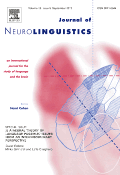
JOURNAL OF NEUROLINGUISTICS
Scope & Guideline
Transforming Perspectives on Language Processing
Introduction
Aims and Scopes
- Cognitive Mechanisms in Language Processing:
The journal explores how cognitive processes impact language production and comprehension, delving into mechanisms like attention, memory, and executive function across different populations. - Neurological Impairments and Language Disorders:
Research published in the journal frequently addresses language disorders resulting from neurological conditions such as aphasia, Alzheimer's disease, and Parkinson's disease, contributing valuable insights into diagnosis and treatment. - Cross-Linguistic and Bilingual Studies:
A significant emphasis is placed on bilingualism and the effects of language switching, providing insights into how language proficiency and experience shape cognitive control and processing. - Neuroimaging and Electrophysiological Approaches:
The journal prominently features studies utilizing neuroimaging techniques (fMRI, EEG) and electrophysiological measures (ERPs) to investigate the neural correlates of language processing, enhancing understanding of the brain's role in language. - Integration of Linguistic and Motor Functions:
Research often investigates the relationship between language and motor functions, examining how gestures and motor control contribute to language production and comprehension.
Trending and Emerging
- Neurophysiological Correlates of Language Production:
There is an increasing focus on understanding the neurophysiological mechanisms underlying language production, particularly through studies utilizing event-related potentials (ERPs) and fMRI to track neural responses during language tasks. - Language and Cognitive Aging:
Research addressing the effects of aging on language processing, particularly in populations with mild cognitive impairment and dementia, is on the rise, emphasizing the importance of language as a cognitive marker in aging. - Impact of Neuromodulation Techniques:
Emerging studies are investigating the effects of neuromodulation techniques (e.g., tDCS, vagus nerve stimulation) on language processing and rehabilitation, indicating a trend towards therapeutic applications in neurolinguistics. - Interaction of Language and Emotion:
The interplay between language processing and emotional context is gaining attention, with studies exploring how emotional factors influence language comprehension and production. - Multimodal Language Processing:
An increasing number of studies are exploring the integration of verbal and non-verbal modalities (e.g., gestures, music) in language processing, highlighting the importance of a holistic understanding of communication.
Declining or Waning
- Traditional Linguistic Approaches:
There appears to be a waning interest in purely traditional linguistic frameworks that do not integrate neurocognitive perspectives, as more researchers favor interdisciplinary approaches that incorporate neuroscience. - Static Models of Language Processing:
Research focusing on static models of language processing is becoming less prevalent, with a noticeable shift toward dynamic and interactive models that account for real-time language use and cognitive flexibility. - Generalized Studies on Language Acquisition:
While language acquisition remains a core topic, generalized studies lacking specificity regarding bilingual contexts or neurological conditions have decreased, signaling a trend toward more nuanced and context-specific research.
Similar Journals
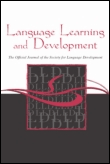
Language Learning and Development
Empowering educators and researchers in language learning.Language Learning and Development, published by Routledge Journals, Taylor & Francis Ltd, is a premier academic journal that stands at the forefront of research in the fields of education and linguistics. With a robust ISSN of 1547-5441 and E-ISSN 1547-3341, this journal not only boasts an impressive Q1 classification in both Education and Linguistics for 2023 but also ranks favorably in Scopus metrics, highlighting its significance in advancing scholarship. Situated in the United Kingdom, it focuses on the intersection of language acquisition, cognitive development, and pedagogical practices, making it an essential resource for researchers, educators, and students alike. Given its commitment to publishing rigorous research articles, Language Learning and Development aims to foster dialogue and explore innovative methodologies in language learning, providing an invaluable platform for contemporary issues and advancements in this dynamic field.
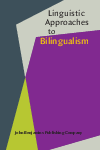
Linguistic Approaches to Bilingualism
Pioneering Interdisciplinary Approaches to Language StudiesLinguistic Approaches to Bilingualism, published by John Benjamins Publishing Co, stands as a leading journal in the field of linguistics, particularly recognizing the complexities and nuances of bilingualism. Established in 2011, this journal has quickly risen to prominence, achieving a Q1 ranking in Linguistics and Language as of 2023, underscoring its impact and relevance within the academic community. With an impressive Scopus ranking that places it in the top 12% and 13% in the Arts and Humanities and Social Sciences categories respectively, it is an essential resource for researchers, professionals, and students alike. The journal aims to publish innovative and interdisciplinary research that contributes to a deeper understanding of bilingual language processing, acquisition, and usage, making it invaluable for those studying the interplay of language and cognition. Although it does not currently offer open access options, its rigorous peer-review process ensures that each publication meets the highest academic standards, fostering insightful discussions and advancements within the field.
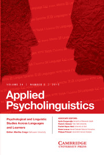
APPLIED PSYCHOLINGUISTICS
Fostering Innovation in Psycholinguistic ResearchApplied Psycholinguistics, published by Cambridge University Press, is a premier journal in the fields of linguistics, psychology, and cognitive science, with a focus on the intersection of language and psychological processes. Since its inception in 1980, the journal has consistently provided a platform for high-quality research, achieving impressive rankings in various categories as of 2023, including Q1 status in Linguistics and Language, and Q1 in Psychology (miscellaneous). With a focus on experimental and cognitive psychology, it fosters the exploration of language acquisition, social communication, and cognitive mechanisms underlying language use. Although it is not available as an Open Access journal, its rigorous peer-review process and impactful articles make it a significant resource for researchers, professionals, and students alike. The journal's commitment to advancing knowledge is evident through its contributions to both theoretical and applied psycholinguistic research. Whether you're a seasoned researcher or a student eager to delve into psycholinguistics, this journal serves as an essential resource for keeping abreast of cutting-edge developments in the discipline.
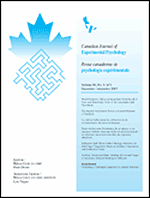
CANADIAN JOURNAL OF EXPERIMENTAL PSYCHOLOGY-REVUE CANADIENNE DE PSYCHOLOGIE EXPERIMENTALE
Charting New Territories in Experimental PsychologyCanadian Journal of Experimental Psychology / Revue canadienne de psychologie expérimentale (ISSN 1196-1961, E-ISSN 1878-7290), published by the Canadian Psychological Association, serves as a vital resource in the fields of Experimental and Cognitive Psychology and general psychological research. With a respectable impact factor that places it in the Q3 category for both Experimental Psychology and miscellaneous Medicine (2023), this journal offers a platform for innovative research that furthers our understanding of psychological processes. Spanning years from 1993 to 2024, it connects researchers, professionals, and students to contemporary findings and methodologies, fostering a collaborative environment for the advancement of psychological science. Though it does not currently offer Open Access, the journal's commitment to quality and relevance in psychological research continues to make it an important part of the academic landscape, supporting the dissemination of knowledge within a global community.
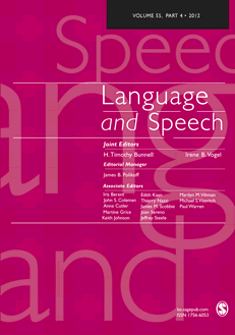
LANGUAGE AND SPEECH
Fostering Innovation in Linguistic and Sociological StudiesLANGUAGE AND SPEECH, published by SAGE PUBLICATIONS LTD, is a premier journal that serves the multifaceted realms of linguistics, speech science, and sociology. With a robust history of scholarly contribution since 1958 and an anticipated continuation through to 2024, the journal is recognized for its high-impact research, boasting a commendable impact factor and achieving Q1 ranking in both Linguistics and Sociology as well as Q2 in Medicine and Speech and Hearing categories as of 2023. The journal, available in both print and online formats with ISSN 0023-8309 and E-ISSN 1756-6053, provides a vital platform for interdisciplinary discourse among researchers, professionals, and students alike. Its rigorous review process and quality publications place it at the forefront of academic inquiry, offering critical insights that advance the understanding of language and its implications in various contexts. As a key resource in the field, LANGUAGE AND SPEECH continues to foster innovation and knowledge dissemination, making it an essential addition to the libraries of those committed to exploring the depths of communication sciences.
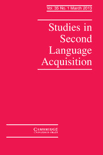
STUDIES IN SECOND LANGUAGE ACQUISITION
Connecting theory and practice in language education.STUDIES IN SECOND LANGUAGE ACQUISITION, published by Cambridge University Press, is a premier journal dedicated to advancing the field of second language acquisition. With an ISSN of 0272-2631 and an E-ISSN of 1470-1545, this journal has carved its niche as a leading resource for scholars and practitioners alike since 1978. Recognized in Q1 quartiles across both Education and Linguistics and Language, and ranked within the top 2% in its fields according to Scopus, it provides a platform for cutting-edge research that addresses the complexities of language learning and teaching. Although it does not currently offer open access, the journal remains widely accessible through institutional subscriptions, ensuring that groundbreaking research reaches a global audience. With a focus on empirical studies, theoretical discussions, and innovative methodologies, STUDIES IN SECOND LANGUAGE ACQUISITION is essential for those seeking to deepen their understanding of language education, making it a must-read for researchers, educators, and students committed to the evolving landscape of language acquisition.
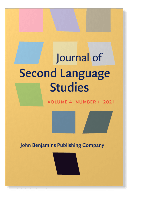
Journal of Second Language Studies
Navigating the Dynamics of Language EducationWelcome to the Journal of Second Language Studies, a premier publication dedicated to advancing the field of language acquisition and pedagogy. Published by John Benjamins Publishing Co in the Netherlands, this journal (ISSN: 2542-3835, E-ISSN: 2542-3843) holds a significant place within the academic community, reflected by its Q2 ranking in Education and Q1 in Linguistics and Language for 2023. With a strong Scopus presence, ranking 197/1088 in Language and Linguistics, it appeals to a broad audience of researchers, educators, and students interested in the complexities of second language learning. The journal has been publishing groundbreaking research from 2018 to 2024, focusing on innovative methodologies, theoretical frameworks, and practical applications that enhance second language education. Although currently not open access, this journal serves as an essential resource for those seeking to deepen their understanding of language dynamics and teaching strategies in a diverse educational landscape.
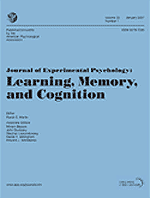
JOURNAL OF EXPERIMENTAL PSYCHOLOGY-LEARNING MEMORY AND COGNITION
Elevating knowledge in learning, memory, and cognition.JOURNAL OF EXPERIMENTAL PSYCHOLOGY-LEARNING MEMORY AND COGNITION is a premier publication of the American Psychological Association, focused on the intricate mechanisms of learning, memory, and cognition. Established in 1975, this esteemed journal has consistently delivered impactful research, evidenced by its Q1 ranking in both Experimental and Cognitive Psychology and Linguistics and Language categories for 2023. With an impressive impact factor and ranked in the top percentiles of multiple fields, it serves as a crucial resource for researchers, professionals, and students who aspire to deepen their understanding of cognitive processes. The journal’s rigorous peer-review process ensures that only the most innovative and high-quality studies are published, providing a platform for groundbreaking findings that advance the field. Though not open access, the insights within each issue are invaluable for anyone interested in the dynamics of human cognition and memory.

JOURNAL OF MEMORY AND LANGUAGE
Illuminating the Pathways of Thought and CommunicationJOURNAL OF MEMORY AND LANGUAGE, published by Academic Press Inc Elsevier Science, is a prestigious journal dedicated to advancing the understanding of cognitive processes related to language and memory. With an impact factor that underscores its authority and relevance, the journal has achieved remarkable recognition, ranking in the Q1 quartile across multiple disciplines such as Artificial Intelligence, Experimental and Cognitive Psychology, Linguistics and Language, and Neuropsychology and Physiological Psychology, as of 2023. With its origins tracing back to 1985, the journal continually provides a platform for high-quality research and innovative studies that intersect diverse fields including cognitive science and linguistics. Although it does not offer open access, the Journal of Memory and Language serves as an essential resource for researchers and professionals seeking to explore the intricate interplay between memory and language. Make sure to access state-of-the-art research that not only informs theoretical frameworks but also has practical implications in real-world situations.
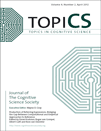
Topics in Cognitive Science
Illuminating the Pathways of Human-Technology InteractionTopics in Cognitive Science, published by WILEY, is a premier interdisciplinary journal that advances the understanding of the cognitive processes that underpin human behavior and interaction with technology. With a commendable impact factor and a strong focus on research from 2009 to 2024, this journal garners significant attention in various subfields, as evidenced by its Q1 ranking in Experimental and Cognitive Psychology and Linguistics and Language, alongside a Q2 position in Artificial Intelligence, Cognitive Neuroscience, and Human-Computer Interaction. Researchers and professionals will find invaluable insights into the latest experimental findings, theoretical discussions, and practical applications that bridge cognitive neuroscience, psychology, and computer science. Topics in Cognitive Science is especially pivotal for those aiming to delve deeper into cognitive mechanisms and their implications within our increasingly digital world, making it an essential resource for students and scholars alike.